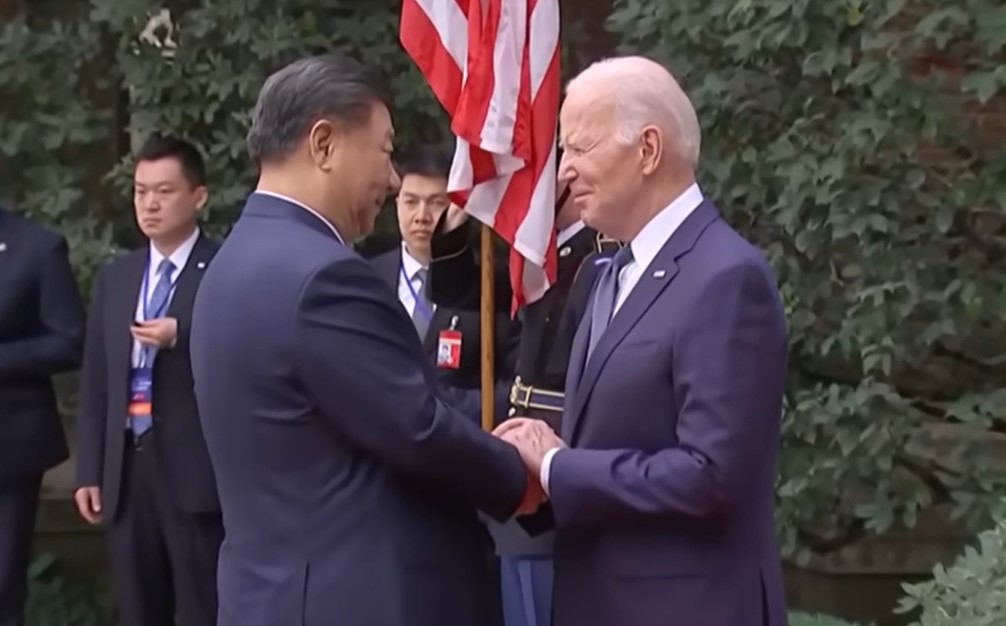Commentary: Big Tent Ideas
GORDON CHANG: Biden Today Has Authority To Unplug China’s TikTok

“If they pass it, I’ll sign it,” President Joe Biden told reporters on March 8, referring to a bill that would force a sale of TikTok to U.S. parties or ban its operation in the U.S.
On March 13, the House of Representatives overwhelmingly passed the “Protecting Americans from Foreign Adversary Controlled Applications Act.” The bill, H.R. 7521, requires the “qualified divestiture”—as determined by the president—of any “foreign adversary controlled application,” within 180 days. The proposed act specifically covers applications operated by TikTok and its Chinese parent, ByteDance Ltd.
If a divestiture does not occur during the 180-day period, the legislation prohibits U.S. app stores and web-hosting services from providing a designated app to the public.
Biden doesn’t have to wait for the bill to wind its way through the Senate and end up on his desk, however. He already has the authority under existing statutes to unplug TikTok.
So far, presidential action against the wildly popular TikTok—it’s on the devices of 170 million Americans—has not been successful. In August 2020, President Donald Trump invoked the International Emergency Economic Powers Act of 1977 and soon after his Commerce Department effectively banned the app by issuing a list of prohibited transactions, including maintaining TikTok in app stores and providing internet hosting services to the app.
ByteDance, TikTok, and TikTok users filed federal court cases challenging Trump’s actions on constitutional and statutory grounds.
Lower courts swiftly issued preliminary injunctions against the president’s action, holding that the personal communication and informational materials exceptions to IEEPA, as the 1977 act is known, likely applied, meaning that he had exceeded his authority under the legislation.
Trump had also banned China’s WeChat. A federal district court issued another preliminary injunction on constitutional grounds.
There were no final decisions in any of the cases because President Joe Biden withdrew his predecessor’s executive orders in June 2021 and the Justice Department subsequently dropped all the court actions.
Biden could invoke IEEPA and re-litigate the issues or seek to amend IEEPA to eliminate the two exceptions, but he has other authority to disconnect TikTok. He can, for instance, press forward with a divestment order that the Committee on Foreign Investment in the United States, the Treasury Department-led interagency task force better known as CFIUS, issued against ByteDance in 2020.
ByteDance and TikTok challenged the CFIUS order on Fifth Amendment and Administrative Procedure Act grounds, but both parties have since agreed with the Biden administration to hold the case in abeyance pending negotiations to resolve the matter.
Biden has another route: prohibiting Chinese ownership under the Trading with the Enemy Act of 1917, which applies only in wartime.
A state of war once existed between the United States of America and the People’s Republic of China, and that act has already been applied to Chinese assets. The Truman administration declared a national emergency and froze Chinese assets in response to China’s surprise entry into the Korean War. On December 17, 1950, the Treasury Department, acting pursuant to the Trading with the Enemy Act, froze $80.5 million of Chinese assets in the United States.
The Korean War continues to today. Fighting stopped on July 27, 1953 with the signing of an armistice, but there has been no peace treaty formally ending the conflict. Although the United States diplomatically recognized the People’s Republic of China in the interim, the state of war with China arguably continues because the Korean War has not formally ended.
Americans may think they’re at peace with China, but that view is not shared by China’s Communists. In May 2019, People’s Daily, the Communist Party’s self-described “mouthpiece” and therefore the most authoritative publication in China, carried a landmark piece declaring a “people’s war” on America.
This phrase has special meaning. “A people’s war is a total war, and its strategy and tactics require the overall mobilization of political, economic, cultural, diplomatic, military, and other power resources, the integrated use of multiple forms of struggle and combat methods,” declared a column carried in April 2023 by PLA Daily, an official news website of the People’s Liberation Army.
China’s regime is in fact waging such a war. Radio Free Asia reported in August 2020 that a People’s Liberation Army intelligence unit, working out of China’s Houston consulate, used big data to identify Americans likely to participate in Black Lives Matter and Antifa protests and then created and sent them “tailor-made” videos on how to organize riots. Related reporting reveals the videos were distributed by TikTok. The State Department ordered the closure of that consulate right after the incident.
Biden, therefore, can now confiscate the app before it entertains more Americans with cat videos—or steals more of their data, encourages greater drug use in the U.S., or fuels further riots on American streets.
Gordon G. Chang is the author of The Coming Collapse of China and China Is Going to War. Follow him on X, formerly Twitter, @GordonGChang.
The views and opinions expressed in this commentary are those of the author and do not reflect the official position of the Daily Caller News Foundation.
All content created by the Daily Caller News Foundation, an independent and nonpartisan newswire service, is available without charge to any legitimate news publisher that can provide a large audience. All republished articles must include our logo, our reporter’s byline and their DCNF affiliation. For any questions about our guidelines or partnering with us, please contact [email protected].

